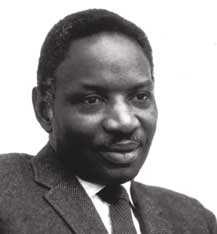- Posted in All University
- Category: Campus News
James F. Collington Served with Famed Red Ball Express During WWII

James F. Collington
Lincoln University, PA (www.lincoln.edu) —In an unprecedented show of support for his alma mater, James F. Collington ’47 has left nearly his entire estate, valued at $1,196,923.83, to Lincoln University. The estate Collington bequeathed to Lincoln includes insurance, securities, a vast record and book collection as well as a condominium valued at $66,000. Mr. Collington, who attended the University on an academic scholarship and graduated magna cum laude with a bachelor of arts degree in psychology, was a member of the football team and the Kappa Alpha Psi Fraternity. Before finishing at Lincoln, Collington served as a technical sergeant in the U.S. Army’s famed Red Ball Express under the command of General Patton during World War II.
It was Mr. Collington’s wish that his estate be distributed to address the following University initiatives:
- $500,000 to endow a scholarship fund for the benefit of single-family students.
- $100,000 endowment to catalog and maintain his extensive music and book collection.
- $596,923.83 to assist the University in upgrading classrooms, dormitories, and finance the current project to renovate the Mary Dod Brown Memorial Chapel.
We truly appreciate Mr. Collington’s support as a son of Lincoln University," said Lincoln President Ivory V. Nelson, Ph.D., who later added that Mr. Collington's "magnificent contribution shows the depth of love and loyalty" that Lincoln alumni have for their alma. After graduating from the University in 1947, Collington had a long and distinguished career as an administrator with the U.S. Treasury Department.
Founded in 1854 as America's first Historically Black University, Lincoln University provides the best elements of a liberal arts and sciences-based undergraduate core curriculum and selected graduate programs to meet the needs of students living in a highly technological and global society. The University is nationally recognized as a major producer of African Americans with undergraduate degrees in the physical sciences (biology, chemistry and physics); computer and information sciences; and biological and life sciences.
Lincoln has the unprecedented distinction among all colleges and universities of having two of its alumni honored with U.S. commemorative stamps. Earlier this year, the U.S. Postal Service honored Thurgood Marshall, the first African-American Supreme Court Justice, and a 1930 Lincoln University graduate, by making him the 26th honoree in Black Heritage Commemorative Series. In February 2002, the U.S. Postal Service also issued a Commemorative, first-class stamp for 1929 Lincoln alumnus Langston Hughes, a world-acclaimed poet.
Lincoln recently kicked off its yearlong celebration of its sesquicentennial with a campus ceremony and Honors Convocation. The celebration of Lincoln’s 150th anniversary will continue through May 2004 with an array of campus and external events, activities, and announcements.